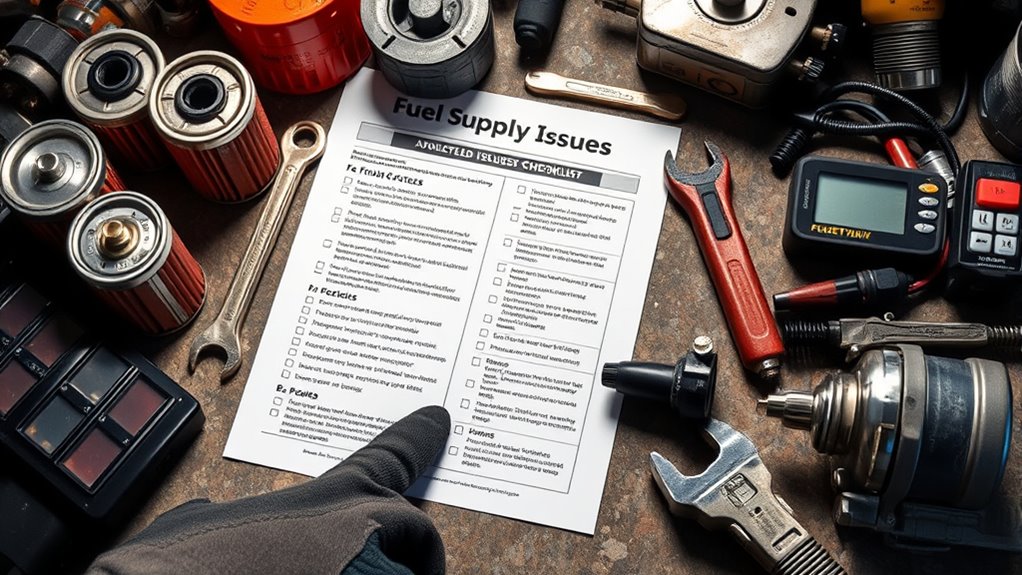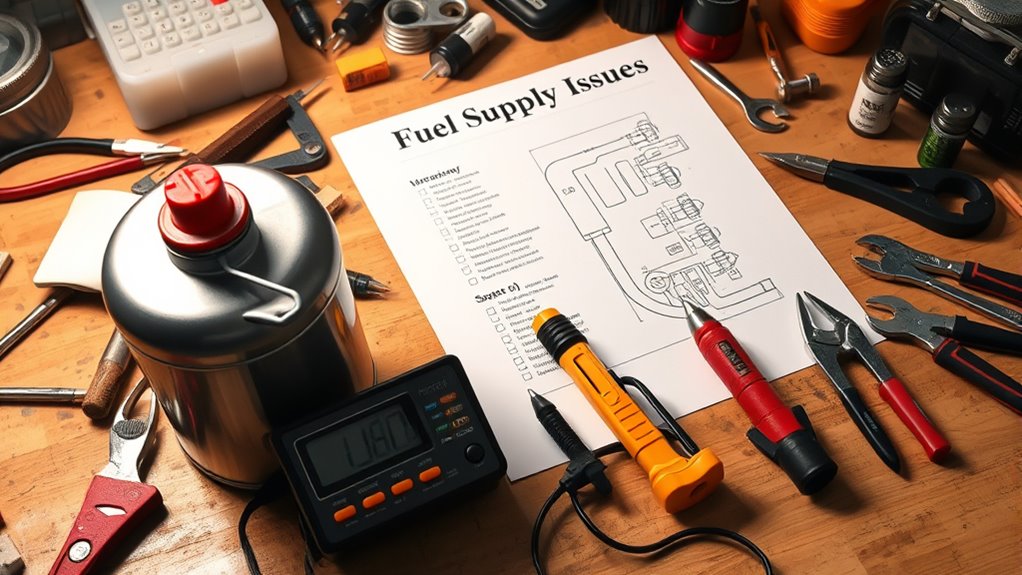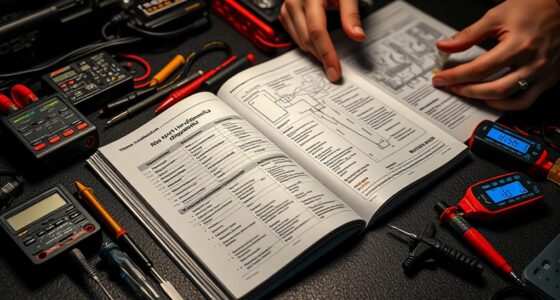To trouble-shoot fuel supply issues, start by checking for leaks and listening for abnormal pump noises. Inspect your fuel filter and replace it if dirty or clogged. Make certain your fuel lines and injectors are clean and free of corrosion. Keep your fuel tank adequately filled to prevent debris from the bottom entering the system. Regular maintenance and awareness of symptoms like engine hesitation help avoid bigger problems—continue to explore these steps for a smoother engine performance.
Key Takeaways
- Regularly inspect fuel lines, injectors, and pump for leaks, corrosion, or blockages.
- Replace fuel filters with manufacturer-recommended parts during routine maintenance.
- Monitor fuel levels and avoid running nearly empty to prevent debris intake.
- Listen for unusual noises from the fuel pump and check for engine hesitation or stalling.
- Use high-quality fuel and plan refueling stops, especially in remote areas, to ensure supply reliability.
Preventing and Addressing Fuel Supply Problems

Are you prepared for unexpected fuel supply disruptions? It’s crucial to stay ahead of potential issues that could leave your vehicle stranded or cause costly repairs. One of the most common problems is fuel contamination, which can happen when dirt, water, or debris enter your fuel system. Contaminated fuel can clog your engine, reduce efficiency, and even cause severe damage if left unaddressed. To prevent this, regular maintenance is key, beginning with ensuring your fuel filter is in good condition. Fuel filter replacement is one of the simplest yet most effective ways to keep contaminants out of your engine. If your filter is clogged or old, it won’t effectively trap impurities, allowing contaminated fuel to reach sensitive parts of your engine. Scheduling routine fuel filter replacements, typically every 20,000 to 30,000 miles depending on your vehicle and driving conditions, can save you from unexpected breakdowns and expensive repairs. When replacing your fuel filter, always use the manufacturer-recommended part and follow proper procedures to guarantee the new filter is properly installed, preventing leaks or bypassing contaminants.
Regular fuel filter replacements prevent contamination, ensuring engine efficiency and avoiding costly repairs.
In addition, understanding the importance of fuel system maintenance can further help you avoid issues. Apart from fuel contamination and filter maintenance, other factors can contribute to fuel supply issues. For instance, clogged fuel lines or corroded injectors can restrict fuel flow, causing engine hesitation or stalling. Regular inspections of these components can help catch problems early. Additionally, ensure your fuel pump is functioning correctly; a failing pump can lead to inconsistent fuel delivery, which impacts engine performance. If you notice symptoms like sputtering, loss of power, or difficulty starting, these could be signs of a fuel delivery problem that warrants immediate attention.
It’s also wise to keep an eye on your fuel gauge and plan refueling stops before your tank runs too low, especially if you’re traveling in remote areas where fuel stations are scarce. Running on a nearly empty tank increases the risk of drawing in debris from the bottom of the tank, which can lead to fuel contamination issues. Always use high-quality fuel from reputable sources to reduce the chance of contaminated fuel entering your system.
Finally, have a basic troubleshooting checklist handy. Check for leaks, listen for abnormal noises from the fuel pump, and verify the condition of your fuel filter during regular maintenance. Being proactive with these steps helps you avoid unexpected disruptions and keeps your vehicle running smoothly. Staying vigilant about fuel contamination risks and performing timely fuel filter replacements can make all the difference when facing unforeseen fuel supply issues.
Frequently Asked Questions
How Can I Identify a Contaminated Fuel Supply?
You can identify a contaminated fuel supply by inspecting for fuel storage maintenance issues like sediment or water at the bottom of tanks. Look for fuel that appears cloudy, discolored, or has an unusual smell, which are common fuel contamination sources. Regularly testing your fuel and monitoring for engine performance problems can also help you spot contamination early, ensuring your fuel remains clean and your equipment runs smoothly.
What Are the Signs of a Failing Fuel Pump?
You can tell your fuel pump is failing when you notice warning signs like engine misfires, sputtering, or difficulty starting your vehicle. These signs often appear before the pump reaches the end of its lifespan. If you experience a loss of power or strange noises, it’s a clear indication to get it checked. Addressing these warning signs early can prevent complete failure and costly repairs down the line.
Can Fuel Additives Improve Fuel System Performance?
Fuel additives can genuinely improve fuel system performance when used correctly. They offer benefits like cleaning fuel injectors, preventing deposits, and enhancing fuel stability, leading to smoother engine operation. These additives help optimize your fuel system, potentially boosting efficiency and saving you money. Always choose high-quality options and follow the manufacturer’s instructions to maximize benefits. When used properly, fuel additives can be a simple way to keep your engine running at its best.
How Often Should I Check My Fuel Filter?
You should check your fuel filter during your vehicle’s maintenance schedule, typically every 12,000 to 15,000 miles or once a year. Regular fuel filter replacement helps prevent clogs and maintains peak fuel flow. If you notice engine trouble or reduced performance, check it sooner. Staying on top of your maintenance schedule ensures your fuel system stays clean and efficient, saving you time and money in the long run.
What Tools Are Essential for Diagnosing Fuel Issues?
Think of diagnosing fuel issues as hunting for clues in a mystery. You’ll need a few key tools: a pressure gauge to measure fuel pressure at various points and a flashlight to inspect fuel injectors for blockages or leaks. These tools help you pinpoint whether the problem lies with the fuel pump, filter, or injectors. With them, you can uncover the root cause and get your vehicle back on track swiftly.
Conclusion
To keep your fuel supply steady, stay proactive. Regularly check for leaks, monitor fuel levels, and keep your equipment well-maintained. For example, imagine a small delivery business that faced unexpected fuel shortages due to neglected filters; a quick inspection could have prevented delays. By following these simple steps, you guarantee smooth operations and avoid costly disruptions. Stay vigilant, and your fuel supply will keep fueling your success without a hitch.









